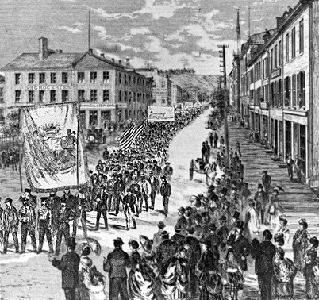150th anniversary of the Nine Hour Movement
& the Adoption of the Trade Unions Act
150 years ago, an international workers movement took root in Canada, where many industrial employees typically worked 12 hours a day, six days a week. Between January and June 1872, workers in Canada took to the streets to demand shorter working hours in what became known as the Nine Hour Movement. Though history largely views the movement to have been a failure, it did lead to some change. The federal government of John A. Macdonald, for example, introduced the Trade Unions Act in June 1872, Canada’s first labour law, which gave workers the legal right to form unions.

Canada’s Labour Movement: Looking back, looking forward: Panel Discussion
In our History of Social Change Conversation: Looking back, looking forward, our panelists reflect upon the evolution of Canada’s labour movement since the 150th Anniversary of the Nine Hour Movement and the Trade Unions Act. They discuss the significant milestones that have had the biggest impact on that evolution and examine the movement’s greatest strengths and its most frustrating challenges. The panel of experts then weigh in on the growing number of young activists and what their activism says about the future of the labour movement.
Patrick Johnson - Bio
Patrick Johnson is the Secretary-Treasurer at UFCW 1518 (United Food & Commercial Workers union), which represents over 26,000 members across British Columbia and the Yukon. A labour activist and environmentalist, Patrick has been organizing communities and handing out leaflets for as long as he can remember. It was through his fight for regional equity that he first witnessed the power of unions to bring progressive change on issues like affordable housing, environmental sustainability and workers’ rights. Patrick started with the UFCW 1518 in 2009, working as an organizer and fighting to bring the rights and benefits of the union to non-unionized workers. Since then, he has led successful organizing drives in the retail and industrial sectors, helping tip the scales toward justice for more British Columbian workers
Rob Kristofferson - Bio
Rob Kristofferson is a professor of history at Wilfred Laurier University who specializes in Canadian labour history, the history of capitalism and public history. He’s also the President of Wilfrid Laurier University Faculty Association (WLUFA). He is the author of Craft Capitalism: Craftsworkers and Early Industrialization in Hamilton Ontario.
Siobhan Vipond - Bio
Siobhan Vipond is the Executive Vice-President of the Canadian Labour Congress. Siobhán is a committed trade unionist and an intersectional feminist committed to a fair and equitable world. She is an advocate for workers’ rights, pensions, gender and racial equity, and the importance of workers’ voices at all levels of government and industry. A champion of women’s economic justice, Siobhán has led campaigns around universal child care, domestic violence leave, ILO C190 and the gendered benefits of raising the minimum wage. She was a founding member of Child Care Now Alberta, the province’s largest group advocating for universal child care. Siobhán chairs the CLC Women’s Advisory Committee and serves as vice-chair for the International Trade Union Confederation (ITUC) Women’s Committee. She also serves on the Canadian Health Coalition and the Trade Union Confederation of the Americas (TUCA) Executive Council.
Sarah Broad
In this digital story, Sarah Broad reminisces on her role organizing the first union at a Starbucks in Canada and leading the first Starbucks in North America to start a movement. She shares how the desire to unionize grew out of health and safety concerns during the pandemic among workers at her Vancouver Island Starbucks. With the help of the United Steelworkers Union, Sarah and her fellow baristas were able to ratify an unprecedented contract with their employer after ten months of negotiation, offering greater health and safety protections, increased accountability and higher wages.
Sarah Broad - Bio
Sarah Broad is the shift supervisor at one of the busiest Starbucks on Vancouver Island and the driving force behind the store’s drive to unionize in 2020 with the help of the United Steelworkers Union. Sarah is the unit chair of the union and was the bargaining committee member who organized her coworkers helping make the coffee house the first Starbucks in Canada to unionize.
Andrea Horwath
In this digital story, Andrea Horwath recalls her introduction to labour rights as the child of an auto worker in a working class family. Those early experiences inspired her to take labour studies at university and to get involved in the labour movement, including as the lead organizer of the Days of Action – an historic 1996 labour protest in Ontario. Andrea shares how that event harkened back to earlier pivotal protests in Canada’s labour history and helped solidify her role as advocate for workers’ rights.
Andrea Horwath - Bio
Andrea Horwath is the mayor of Hamilton, Ontario, a job she has held since November 2022. She previously served as the member of Provincial Parliament (MPP) for Hamilton Centre from 2004 to 2022, as leader of the Ontario New Democratic Party (NDP) from 2009 to 2022 and as the leader of the Official Opposition in Ontario from 2018 to 2022.
